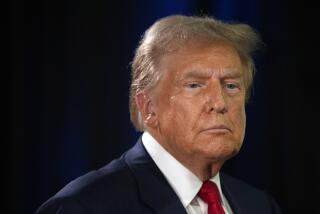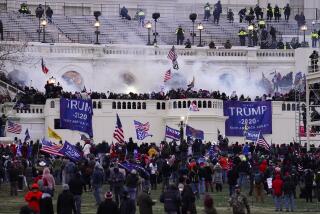Court Dismisses Insider Charges Facing 3 Traders : Action Is Ironically a Victory for Prosecution; New Indictments Expected
- Share via
NEW YORK — A federal judge dismissed insider trading charges against three prominent Wall Street securities traders Tuesday in what was, ironically, a blow to the defendants.
The ruling by U.S. District Judge Louis Stanton means that the traders could be reindicted at virtually any time in the next four years, or until the statute of limitations expires on the conspiracy and securities-fraud counts, according to one defense attorney.
Stanton’s decision was the first victory in more than a week for the beleaguered prosecutors in the case.
It is the first case against Wall Street figures directly or indirectly associated with former stock speculator Ivan F. Boesky in which the defendants have maintained their innocence and insisted on trial. As a result, a courtroom victory is crucial if U.S. Atty. Rudolph W. Giuliani’s image as an invincible investigator of securities industry abuses is to be preserved.
The defendants--Robert M. Freeman, chief stock arbitrageur for the firm of Goldman, Sachs & Co.; Richard B. Wigton, a top arbitrageur for Kidder, Peabody & Co., and Timothy L. Tabor, a former associate of Wigton’s--were arrested on insider trading charges in February, indicted April 9 and were originally scheduled to be tried in federal court beginning today.
Instead, prosecutors moved last week to delay the trial for at least two months, arguing that their investigation had proved so complicated and broad that the additional time was crucial. The prosecutors had also indicated that, if they were forced to begin trial immediately, they might lose the case.
When Stanton denied that motion, the prosecutors moved to dismiss the indictment to gain the necessary breathing room.
The defense lawyers opposed the dismissal on the grounds that it left their clients in legal and professional limbo. Tabor is unemployed; Wigton had been suspended by Kidder, and Freeman has stayed off the Goldman trading floor.
“My client is now sitting on a ledge, waiting for something to drop out of the sky on him,” complained Wigton’s attorney, Stanley Arkin, after Stanton’s ruling Tuesday.
The defense sought either to have the indictment dismissed “with prejudice,” meaning that another indictment could not be brought on the same evidence, or have the trial proceed on the original indictment. But Stanton dismissed the indictment “without prejudice.” Arkin said the defendants probably have no right to appeal Stanton’s ruling.
In briefs filed before Tuesday’s hearing, the defendants had argued that the prosecutors’ dismissal motion had been a subterfuge designed to win time to improve a weak case and would have the effect of harassing the defendants by leaving the threat of prosecution over their heads indefinitely.
Prosecutors had said repeatedly that they were planning to bring a broader indictment against the men but their timetable for the additional counts had been steadily moving forward.
But Stanton said from the bench that “dropping the charges was not part of the government’s program, but was done under constraint”--that is, as a result of his own refusal to delay the trial.
More to Read
Inside the business of entertainment
The Wide Shot brings you news, analysis and insights on everything from streaming wars to production — and what it all means for the future.
You may occasionally receive promotional content from the Los Angeles Times.










